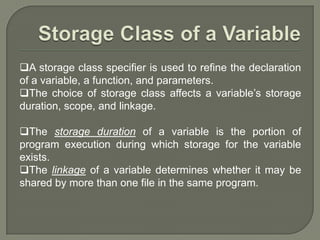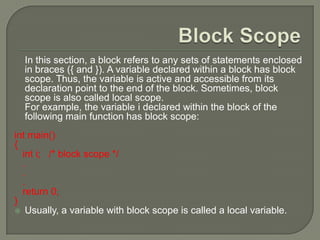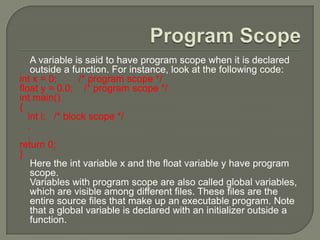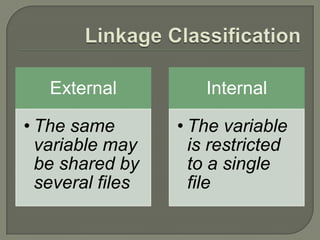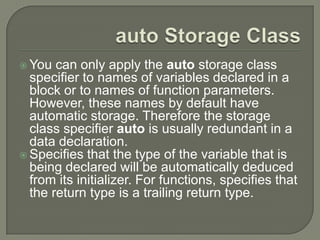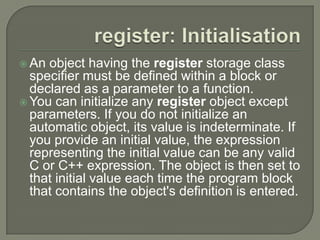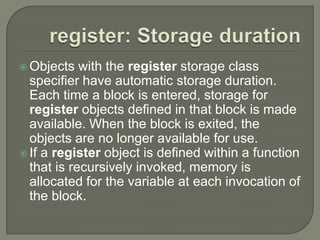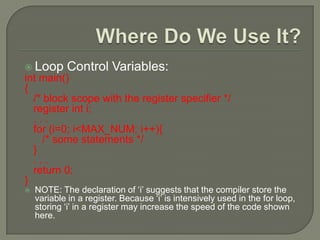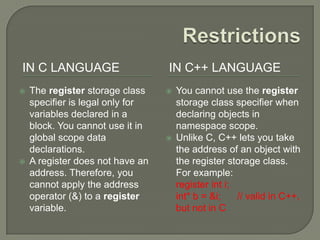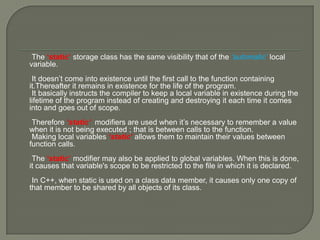Storage Class Specifiers in C++
- 1. -Reddhi Sekhar Basu (559)
- 3. Every C++ variable has a storage class and a scope. The storage class determines the part of the memory where storage is allocated for an object and how long the storage allocation continues to exist. It also determines the scope(visibility )which specifies the part of the program over which the variable name is visible i.e. the variable is accessible by name. Lifetime of a variable/function or program is the time during which the variable/function or program holds memory space.
- 4. Automatic i.e. auto Register Static External i.e. extern
- 5. A storage class specifier is used to refine the declaration of a variable, a function, and parameters. The choice of storage class affects a variable’s storage duration, scope, and linkage. The storage duration of a variable is the portion of program execution during which storage for the variable exists. The linkage of a variable determines whether it may be shared by more than one file in the same program.
- 7. In this section, a block refers to any sets of statements enclosed in braces ({ and }). A variable declared within a block has block scope. Thus, the variable is active and accessible from its declaration point to the end of the block. Sometimes, block scope is also called local scope. For example, the variable i declared within the block of the following main function has block scope: int main() { int i; /* block scope */ . . . return 0; } Usually, a variable with block scope is called a local variable.
- 8. Function scope indicates that a variable is active and visible from the beginning to the end of a function. In C, only the goto label has function scope. For example, the goto label, start, shown in the following code portion has function scope: int main() { int i; /* block scope */ . . start: /* A goto label has function scope */ . . goto start; /* the goto statement */ . . return 0; } Here the label start is visible from the beginning to the end of the main() function. Therefore, there should not be more than one label having the same name within the main() function.
- 9. A variable is said to have program scope when it is declared outside a function. For instance, look at the following code: int x = 0; /* program scope */ float y = 0.0; /* program scope */ int main() { int i; /* block scope */ . . return 0; } Here the int variable x and the float variable y have program scope. Variables with program scope are also called global variables, which are visible among different files. These files are the entire source files that make up an executable program. Note that a global variable is declared with an initializer outside a function.
- 10. Automatic :Storage for the variable is allocated when the surrounding block is executed; storage is deallocated when the block terminates, causing the variable to lose its value. • auto • register Static : The variable has a permanent storage location, hence it retains its value throughout the execution of the program. • static • extern
- 11. External • The same variable may be shared by several files Internal • The variable is restricted to a single file
- 13. The auto storage class specifier lets you explicitly declare a variable with automatic storage. The auto storage class is the default for variables declared inside a block. A variable x that has automatic storage is deleted when the block in which x was declared exits. Until C++11, auto had the semantic of a storage duration specifier. Syntax • auto variable initializer • auto function -> return type
- 14. You can only apply the auto storage class specifier to names of variables declared in a block or to names of function parameters. However, these names by default have automatic storage. Therefore the storage class specifier auto is usually redundant in a data declaration. Specifies that the type of the variable that is being declared will be automatically deduced from its initializer. For functions, specifies that the return type is a trailing return type.
- 15. You can initialize any auto variable except parameters. If you do not explicitly initialize an automatic object, its value is indeterminate. If you provide an initial value, the expression representing the initial value can be any valid C or C++ expression. The object is then set to that initial value each time the program block that contains the object's definition is entered. If automatic variables are not initialized they will contain garbage. Note that if you use the goto statement to jump into the middle of a block, automatic variables within that block are not initialized.
- 16. Objects with the auto storage class specifier have automatic storage duration. Each time a block is entered, storage for auto objects defined in that block is made available. When the block is exited, the objects are no longer available for use. An object declared with no linkage specification and without the static storage class specifier has automatic storage duration. If an auto object is defined within a function that is recursively invoked, memory is allocated for the object at each invocation of the block.
- 18. The word register is borrowed from the world of computer hardware. Each computer has a certain number of registers to hold data and perform arithmetic or logical calculations. Because registers are located within the CPU (central processing unit) chip, it's much quicker to access a register than a memory location. Therefore, storing variables in registers may help to speed up your program. You can apply this specifier to variables when you think it's necessary to put the variables into the computer registers.
- 19. However, the register specifier only gives the compiler a suggestion. In other words, a variable specified by the register keyword is not guaranteed to be stored in a register. The compiler can ignore the suggestion if there is no register available, or if some other restrictions have to apply. Because of the limited size and number of registers available on most systems, few variables can actually be put in registers. If the compiler does not allocate a machine register for a register object, the object is treated as having the storage class specifier auto.
- 20. An object having the register storage class specifier must be defined within a block or declared as a parameter to a function. You can initialize any register object except parameters. If you do not initialize an automatic object, its value is indeterminate. If you provide an initial value, the expression representing the initial value can be any valid C or C++ expression. The object is then set to that initial value each time the program block that contains the object's definition is entered.
- 21. Objects with the register storage class specifier have automatic storage duration. Each time a block is entered, storage for register objects defined in that block is made available. When the block is exited, the objects are no longer available for use. If a register object is defined within a function that is recursively invoked, memory is allocated for the variable at each invocation of the block.
- 22. Loop Control Variables: int main() { /* block scope with the register specifier */ register int i; . . . for (i=0; i<MAX_NUM; i++){ /* some statements */ } . . . return 0; } NOTE: The declaration of ‘i’ suggests that the compiler store the variable in a register. Because ‘i’ is intensively used in the for loop, storing ‘i’ in a register may increase the speed of the code shown here.
- 23. IN C LANGUAGE IN C++ LANGUAGE The register storage class specifier is legal only for variables declared in a block. You cannot use it in global scope data declarations. A register does not have an address. Therefore, you cannot apply the address operator (&) to a register variable. You cannot use the register storage class specifier when declaring objects in namespace scope. Unlike C, C++ lets you take the address of an object with the register storage class. For example: register int i; int* b = &i; // valid in C++, but not in C
- 25. The mutable storage class specifier is available only in C++ It is used only on a class data member to make it modifiable even though the member is part of an object declared as const.
- 26. class A { public: A() : x(4), y(5) { }; mutable int x; int y; }; int main() { const A var2; var2.x = 345; // var2.y = 2345; } In this example, the compiler would not allow the assignment var2.y = 2345 because var2 has been declared as const. The compiler will allow the assignment var2.x = 345 because A::x has been declared as mutable.
- 28. The ‘static’ storage class has the same visibility that of the ‘automatic’ local variable. It doesn’t come into existence until the first call to the function containing it.Thereafter it remains in existence for the life of the program. It basically instructs the compiler to keep a local variable in existence during the lifetime of the program instead of creating and destroying it each time it comes into and goes out of scope. Therefore ‘static’ modifiers are used when it’s necessary to remember a value when it is not being executed ; that is between calls to the function. Making local variables ‘static’ allows them to maintain their values between function calls. The ‘static’ modifier may also be applied to global variables. When this is done, it causes that variable's scope to be restricted to the file in which it is declared. In C++, when static is used on a class data member, it causes only one copy of that member to be shared by all objects of its class.
- 29. #include <iostream> #include<conio.h> using namespace std; static int cost = 10; /* Global variable */ class c { public : static int i=5; void func() { cout<<"i is "<<i<<endl; i--; } void func2() { cout<<“ cost is " <<cost<<endl; cost--; }
- 30. class d { public : void disp() { cout<<"cost is " <<cost<<endl; } }; main() { c ob; d ob1; while( ob.i!=0) ob.func(); ob.func2(); cost-=5; ob1.disp(); getch(); }
- 31. i is 5 i is 4 i is 3 i is 2 i is 1 i is 0 cost is 10 cost is 4.
- 33. Unlike local variables global variables are declared outside of any function or class. So a global variable is visible to all the functions in a file. More precisely global variables are visible to only those functions in the file that follow the variable’s definition in listing. Usually we want global variables to be visible to all functions or classes in the file so we put their definition at the beginning of the listing.
- 34. file1 #include<iostream> #include<conio.h> using namespace std; int i; // initialized to 0 by default as global extern void write_extern(); //to be discussed little later class c { public : void disp() { cout<<“The value of i is “<<i<<endl; i++; } };
- 35. class d { public : void disp1() { cout<<“The value of i is “<<i<<endl; } }; main() { c ob; d ob1; ob.disp(); i++; ob1.disp1(); write_extern(); getch(); }
- 36. Output : The value of i is 0 The value of i is 2 Note : • Here the first thing to be noted is that variable i, declared at the very beginning right after import ing the header files. This is done so that i is visible to all the classes or functions under the same file. • i is declared though but not initialized by any value as global variables get automatically initialized to 0 if not explicitly done. • Lastly as said earlier if i here was specified following class c but before class d then it would be visible in class d & main() function but NOT in class c since global variables are visible to functions or classes that follow the variable’s definition in listing. Lifetime & visibility : Global variables are automatically given the static storage class specifier during their definition. So they exist for the life of the program. Memory space is set aside for them when the program begins and continues to exist until the program ends.
- 37. The key word ‘extern’ basically extends the scope of a global variable. ( Global variables are ‘extern’ by default.) It is used to give a reference of a global variable that is visible to ALL the program files. When ‘extern’ precedes a variable, it cannot be initialized as all it does is point the variable name at a storage location that has been previously defined. When we have multiple files and we define a global variable or function which will be used in other files also or say the program is spread across two or more files, then ‘extern’ will be used to give reference of defined variable or function. So basically ‘extern’ is used to declare a global variable or function in other files. The extern modifier is most commonly used when there are two or more files sharing the same global variables or functions . A small demonstration is given from the previous example to help understand the concept better :
- 38. file2 #include<iostream> #include<conio.h> using namespace std; extern int i; //..here the extern keyword is used to declare i in this file and it refers to g.v. i declared in the previous file… class a { public : void write_extern() { cout<<“The value of i is “<<i<<endl; } }; Note : It is because of the ‘extern’ specifier that variable i could be used in this file & void write_extern() in the previous file.
- 39. Static local Global Visibility function file Lifetime program program Initialized value 0 0 Purpose Same as local but retains value when function terminates. Variables used by several classes & functions but inside the same file. Comparison between Static local and global :
- 40. Books: 1. Robert Lafore 2. Herbert Schildt Websites: 1. Hawaii.edu 2. Tutorialspoint.com





